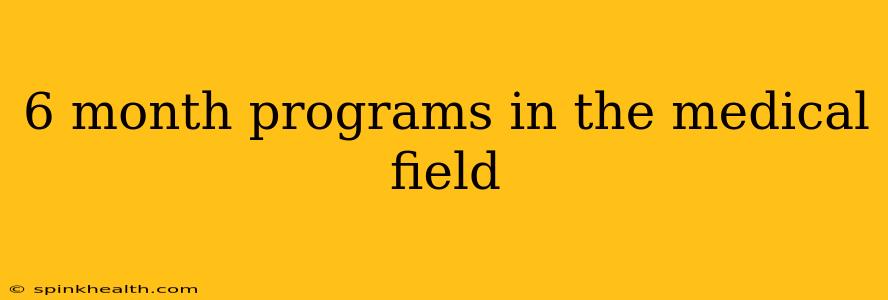Unlocking Your Medical Future: A Deep Dive into 6-Month Medical Programs
The medical field is vast and exciting, offering numerous career paths for those eager to make a difference. For individuals looking for a quicker entry point or a focused skill enhancement, 6-month programs can be a game-changer. But what are these programs? What do they offer? And which one is right for you? Let's embark on a journey to uncover the possibilities.
My name is Alex, and I've spent years researching and working within the healthcare sector. I've seen firsthand the impact these shorter programs can have, both on individuals seeking career advancement and on the healthcare system itself. This guide is based on my experience and thorough research, designed to help you navigate the options and make informed decisions.
What Types of 6-Month Medical Programs Exist?
The beauty of 6-month medical programs lies in their diversity. They're not a one-size-fits-all solution; rather, they cater to a range of interests and skill levels. We'll explore some popular options:
-
Medical Assistant Programs: These are among the most common 6-month options. They equip students with the skills to assist physicians in clinical settings, taking patient histories, vital signs, and assisting with examinations. They often lead to certification and quick employment.
-
Phlebotomy Technician Programs: Focusing specifically on drawing blood, phlebotomy is crucial in healthcare. A 6-month program provides the necessary training and certification to begin a career in this in-demand field.
-
Medical Billing and Coding Programs: The administrative side of healthcare is just as critical. These programs teach students how to accurately code medical procedures and services, ensuring smooth billing processes and financial stability for medical practices.
-
Emergency Medical Technician (EMT) Programs (Some Variations): While a full EMT certification usually takes longer, some accelerated programs might offer a pathway to entry-level EMT positions within a 6-month timeframe, potentially focusing on specific areas like basic life support. Always verify the program's complete curriculum and certification outcomes.
-
Specialized Technician Programs: Depending on location and institution, you may find programs concentrating on areas like EKG (electrocardiogram) technology, or other specialized medical technician roles. These are usually very focused and aim for rapid entry into the workforce.
What are the Career Prospects After Completing a 6-Month Program?
The career opportunities following a 6-month medical program vary significantly based on the specific program. Some common pathways include:
- Medical Assistant: Employment in clinics, hospitals, and physician's offices.
- Phlebotomy Technician: Hospitals, blood banks, and medical laboratories.
- Medical Biller/Coder: Hospitals, clinics, and medical billing companies.
- EMT (depending on program scope): Emergency medical services, hospitals, and private ambulance services.
- Specialized Technician: Specific roles within hospitals or clinics based on the program's focus.
What are the Admission Requirements for These Programs?
Admission requirements differ between institutions and programs. Generally, you'll need:
- A high school diploma or GED.
- Sometimes, a minimum GPA.
- Possibly, prerequisite coursework, especially for programs requiring some prior knowledge in science or related fields.
- Background checks and health screenings may be required, especially for programs involving direct patient care.
How Much Does a 6-Month Medical Program Cost?
Tuition costs vary greatly depending on the institution, location, and the specific program. Consider factors like tuition fees, books, supplies, and any potential certification exam fees. Researching financial aid options, scholarships, and loan programs is crucial for budgeting.
Are 6-Month Medical Programs Worth It?
The value of a 6-month medical program depends on your personal goals and circumstances. These programs provide a quick route to entering the medical field, particularly if you possess a high level of self-discipline and focus. However, it's essential to carefully evaluate the program's curriculum, reputation, and career outcomes before committing your time and resources. A shorter program might not be as extensive as a longer program, thus influencing the depth of your skills and knowledge.
Choosing the Right Program for You:
Remember, careful research is paramount. Don't rush into a decision. Investigate different programs, compare their curricula, and verify accreditation to ensure the quality of your education. Consider your strengths, interests, and long-term career aspirations when making your choice. Your success in the medical field begins with making an informed and thoughtful decision.

